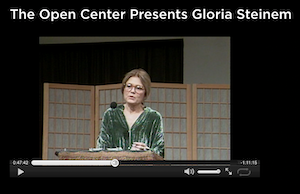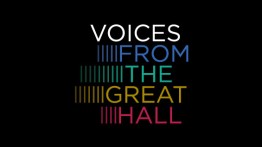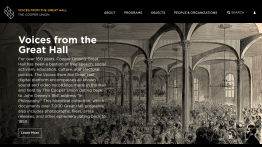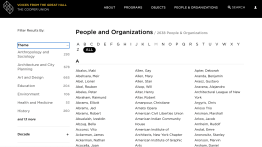New Online Archive Offers a Glimpse into More than a Century of American History
POSTED ON: May 18, 2022
The Cooper Union introduces Voices from the Great Hall, an extraordinary new public resource that tells the history of New York and the nation through the words of the people who helped to shape it from the stage of the storied Great Hall. Voices from the Great Hall is a digital archive, free and accessible to anyone, and generously supported by The Robert David Lion Gardiner Foundation. This growing collection presents all known sound and video recordings made in Cooper Union’s historic Great Hall dating back to 1941 and continuing to the present, as well as 8,900 objects, such as photographs, tickets, and fliers, related to more than 3,000 Great Hall programs dating to 1859.
“Our Great Hall, once the largest gathering place in New York City, has been an important destination where people from all walks of life have organized and presented their views on the pressing matters of their time, a legacy that continues today,” says Laura Sparks, President, The Cooper Union. “We are so grateful for the Gardiner Foundation’s leadership and commitment to preserving essential New York history. Their support has made this digital Great Hall archive possible. There is so much that we, as an engaged citizenry, can draw on and learn from these historical perspectives, and that is precisely our hope for the Voices from the Great Hall archive—that it will serve as a resource for shaping the future of our shared civic and cultural life.”

Voices from the Great Hall is home to recordings of some of the most renowned American thinkers and leaders from across disciplines, including Presidents Barack Obama and Bill Clinton; Supreme Court Justice Thurgood Marshall; feminist, journalist, and activist Gloria Steinem; nearly every New York City mayor from the 1950s to the present; Congressional leaders like John Lewis and Adam Schiff; cultural anthropologist Margaret Mead; architect Louis I. Kahn; psychologist and writer Timothy Leary; and poet and author Carl Sandburg. The digital archive is searchable by date, speaker, and 20 different themes such as Anthropology and Sociology; Architecture and City Planning; Environment; Labor and Economics; New York; Politics and Activism; Racial Justice and Human Rights; and Women, Gender, and Sexuality.
“The Robert David Lion Gardiner Foundation is pleased to have helped support such a vibrant educational resource that reflects the American experience. The Cooper Union has been the site of so many important conversations, and we know that the Voices from the Great Hall archive will become an instrumental tool for so many undertaking historical research and those interested in how that history informs our present,” said Kathryn M. Curran, Executive Director of the Gardiner Foundation.
Peter Cooper—a 19th century global humanist, inventor, industrialist, and pioneer of philanthropy—established the Great Hall in 1858 as a place where civic leaders, artists, scientists, and everyday people could convene on the issues critical to the city and beyond. The Great Hall has been host to Abraham Lincoln, who delivered his famous “Right Makes Might” speech at Cooper; Frederick Douglass and Chief Red Cloud; and 11 American presidents either before or during their administrations. The Great Hall was also the site of the first public meeting of the NAACP, a cradle of the women’s suffrage and American labor movements, the early meeting place of the precursor to the American Red Cross, and the site of critically formative ACT UP meetings. In recent years, guests have addressed everything from art and advocacy, to civil rights, immigration, the Electoral College, the death penalty in America, monuments, the climate crisis, the world’s pandemic response, and New York City politics.
It took a team of archivists and designers nearly four years to create the archive which consists of the new digital platform and a collection compiled from multiple sources. Many of the historic recordings had been languishing in storage in Cooper Union’s audio-visual department for decades. With the onset of this project, they were rehoused, preserved, and cataloged. Additional recordings were transferred from The Irwin S. Chanin School of Architecture, The Cooper Union School of Art, and New York City Municipal Archives WNYC New York Public Radio collection. Many of the recordings made in partnership with WNYC from 1968 to 1970 were syndicated nationally by the National Association of Educational Broadcasters. Ultimately, the archive project grew into a larger cause to consolidate every available piece of Great Hall information at The Cooper Union into this formalized resource. The physical and born digital materials represented on the site are archived and available in The Cooper Union Library Archives and Special Collections.
“We made many discoveries as the recordings were removed from dusty boxes and came to light,” said Steven Hillyer, Project Director of the effort. “The most joyful moments came when we received digital files and began listening. Hearing the voices of so many luminaries for the first time was astounding, Lewis Mumford in particular. His oratorial skills were unparalleled. His 1958 lecture is part of a treasure trove of thoughts, events, and voices that have the ability to inform our current and future thinking on so many important issues. The Great Hall digital archive will be invaluable for historic research and celebrated through future Great Hall programming for years to come.”
Programming in the Great Hall has been the responsibility of both The Cooper Union and external groups over time. During the late nineteenth century, The Cooper Union hosted public lectures on government, political economy, and the American Revolution, which evolved into the Free Saturday Evening Lectures, coordinated by NYC Mayor Abram Hewitt, who was Peter Cooper’s son-in-law. In 1893 and 1894, Columbia University and the New York City Board of Education also contributed to programming. The People’s Institute took over programming in 1898, providing free lectures until 1934. Subsequently, The Cooper Union resumed programming responsibilities and created “The Cooper Union Forum," a platform for free lectures and performances held several nights per week. Today, the college continues an annual schedule of public programs on a variety of topics that are free and open to both live and livestreamed audiences.
Funding for Voices From the Great Hall was provided by The Robert David Lion Gardiner Foundation.







